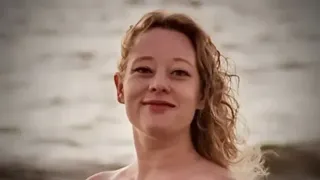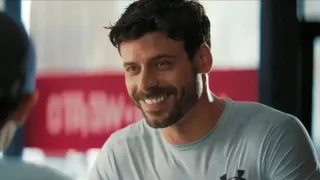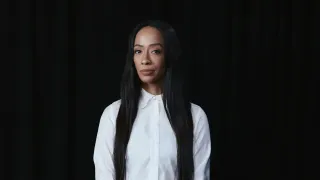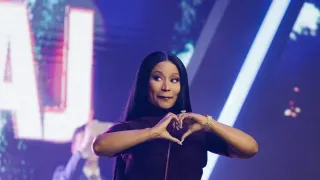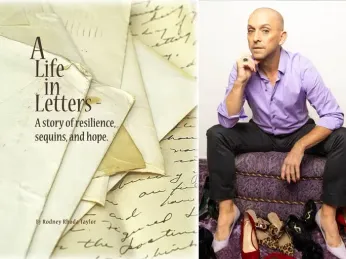
September 29, 2025
Words: Rodney Rhoda Taylor – Author’s path to page and stage
Michele Karlsberg READ TIME: 2 MIN.
Rodney Rhoda Taylor is a dynamic voice in contemporary queer storytelling, known for their sharp wit, emotional honesty, and theatrical flair. They graduated from San Francisco State University with a degree in Creative Writing and Rodney took a non-linear path to the page and stage, eventually finding his footing in the world of playwriting.
They co-founded with Joe Frank the Left Coast Theatre Co., San Francisco’s home for original LGBTQ+ theater. Rodney has written, directed, and acted in a range of productions including “Eros,” “Poolside,” “Good-Bye Cupid,” and “P.S. I Love You.” Their work balances humor and heart, often exploring themes of love, identity, and resilience with a distinct narrative voice.
Inspired by Carrie Bradshaw and driven by a deep love for storytelling (and stylish shoes), Rodney’s creative journey recently expanded into memoir with the release of their debut book, “A Life in Letters: A Story of Resilience, Sequence, and Hope.” In addition to writing, they blog weekly about food, life, and his ongoing search for Cupid. Rodney crafts stories that celebrate the complexities of queer life with warmth, vulnerability, and unapologetic charm.
Michele Karlsberg: Your memoir is written as a series of letters. What inspired you to choose this format rather than a traditional linear narrative?
Rodney Rhoda Taylor: I was taking a letter-writing class when I was working towards my degree and thought it would be an interesting idea to write a collection of letters to the thoughts, feelings and emotions we all have.
However, when I graduated, I ended up concentrating on the theater company and didn’t complete it. It wasn’t until about three years ago when I started writing again that I began working on the book. At the time it was still a more generalized collection of letters. It was in the editing process that it turned into a memoir because the original book didn’t have any depth or emotion. I figured it’d be more relatable to people if I put myself into it.
In a more traditional narrative, I wouldn’t have been able to pointedly share how these thoughts and emotions and events affected me. By writing letters to them, I’m able to address them directly and share more about your interactions better than saying, this is how I felt. I think the letters make the story more relatable because of the subject matter, plus to the best of my knowledge, it hasn’t been done before.
You mention being inspired by Carrie Bradshaw. In what ways did her character shape your approach to writing or storytelling?
Well, she most defiantly influenced my choice of cocktail, which is the Cosmopolitan. The way Carrie writes is very unique, or I thought it was. She always asks questions at the beginning of her writing and then spends the rest of the piece by providing her own answers.
At some point in any “Sex and the City” episode, we always see her writing and proposing a question about that episode’s theme or obstacle she faces. It’s that element of creating questions about certain topics that I’ve used in my own writing, especially in the book. In many of the letters I proposed questions to whomever the letters were addressed, and then I explore answers to the question I asked throughout the rest of what I’m writing.
After graduating with a degree in Creative Writing, you experienced a period of uncertainty. What advice would you give to new graduates facing a similar crossroads?
I’d say that it’s okay to be uncertain and to embrace that feeling. We’ve all been there at some point in our life of not knowing what we wanted to do. Instead of stressing out about it, let life flow and the universe will point you in the direction you should go.
After I got my degree, I wasn’t sure what I was going to do with it, so I dabbled and experimented with various forms of writing. Then a friend showed me an invite he found for an LGBTQ playwriting group. I joined and that helped kick off my writing career. Sometimes you just have to let the universe point you in the direction you should take.
Many of the letters in “A Life in Letters” are vulnerable, candid, and deeply personal. Was there one letter that was especially difficult, or liberating, to write?
I’d say all the letters were liberating, as I was able to write to those feelings and emotions and tell them exactly what I thought and how they affected me. While I did reveal several personal events in the book, the letters to death were the hardest ones to write. Writing to Death and expressing those feelings and the hurt they caused put me right back in the moment of losing loved ones. Each time I tried editing the letters, I would just be a puddle of tears. It finally got to the point where I did one final edit and said that’s it. I couldn’t go back and read the letters again as they were just too painful.
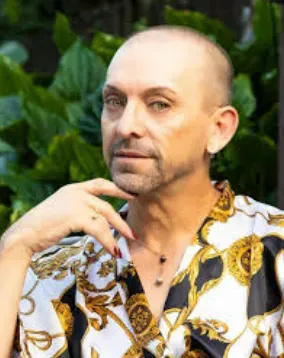
Your background in playwriting clearly influences your memoir. How do you think your theater experience shaped the voice or pacing of your book?
It’s funny you ask that question, as I’m trying to figure out how to turn my memoir into a one-man show. I’d have to say that my theater experience helped with the vulnerability I present in the book. Being in the theater and writing plays one makes themselves vulnerable, and open.
Acting, especially in theater, one is literally center stage in front of a live audience, which is a very vulnerable spot to be in. The theater taught me the ability to be open, and to put myself out there in a very public manner.
You co-founded the Left Coast Theatre Co., which champions LGBTQ voices. How has your identity influenced your writing, both in theater and memoir?
As an out gay man, I’ve tried to share what it means to be gay with others outside the community. That we are searching for the same thing as everyone else is: love, acceptance, and happiness. The flip side of that is I’ve also tried to share what it’s like when society tells us that we shouldn’t exist and the hate and prejudice receive.
There’s humor and heartbreak in your letters, sometimes within the same paragraph. How do you balance levity with emotional depth in your storytelling?
I make people cry so that I can then make them feel better through laughter. All kidding aside, all I can really say about this is that when writing and I shared something personal or really emotional and if it made me sad, which I’m a very sensitive person and yes my own writing could make me sad, I’d automatically write something uplifting or funny to bring the mood of the letter back up. I didn’t want to leave the reader in a sad moment. But sometimes, depending on the topic and the importance of the emotion, I unfortunately had to leave the reader feeling the emotion.
You took a break from writing to focus on yourself. What brought you back, and how did that time away reshape your creative process or voice?
What brought me back to writing was food. During COVID, I taught myself how to cook, as I had nothing else to do. The cooking process allowed me to shut off all the other stuff in my head, as I was still battling depression at the time. When the restrictions around COVID started to lift, I had moved to Reno and was feeling better about myself. I could socialize again, and the dark cloud of depression had started to leave.
I was in a good space emotionally speaking and felt I was ready to start writing, so I thought it would be a great idea to share some of the meals I made during COVID. Then one day, I was working on cleaning up the files in my computer and came across the original draft of this book and started to edit it again. I told a friend of mine what I was thinking about for the book and he said it sounded like a good project and that I should work on it, so I did and here we are.
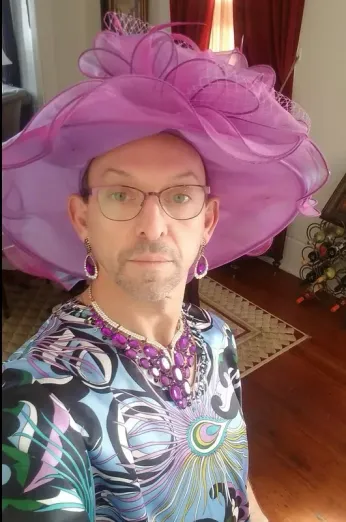
If you could send a real letter to one of the emotions you’ve personified in your memoir, like Puberty or Heartbreak, what would you say today?
I’d have to say I’d send the letter to Masculinity. We’ve had a very odd relationship my entire life. I’ve always been compared to this “thing” and told I’m not masculine enough, but no one can answer what that actually means.
In my letter, I’d ask them directly what they are. What are they supposed to be and what is so special about them that the male species is supposed mirror whatever they are. Then I would be my usual self and put them in their place and let them know that they are not as great as what they think they are and that their time has passed and it’s time for them to step out of the way and let the male species be who they are supposed be.
Your book resonates with themes of resilience and self-acceptance. What do you hope readers, especially young queer readers, take away from your story?
I hope they come away with a few things, but for me I’d say there are three important take ways:
1: they are not alone and that there are other people who are experiencing the same feelings as they are. Whether these feelings are about attraction to a person of the same sex, or the need to be loved, or self-doubt, we are all going through the same things.
2: To never give up. Even in the darkest moments, to never give up. I’ve been there. I’ve had some serious dark moments, but I kept on pushing forward and was able to use that as part of my book.
And the last thing is to always be oneself. Don’t let other people tell you who you are or dampen your spirit. It’s your life, you have to do what makes you happy, not make them happy.
https://www.rodneyrhodataylor.com/
https://lctc-sf.org
Michele Karlsberg Marketing and Management specializes in publicity and marketing for the LGBTQ+ community. This year, Karlsberg celebrates 36 years of successful campaigns. www.michelekarlsberg.com
